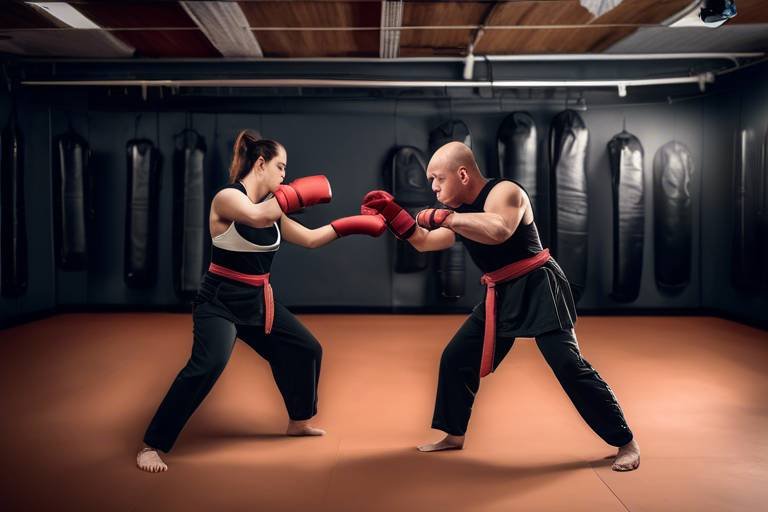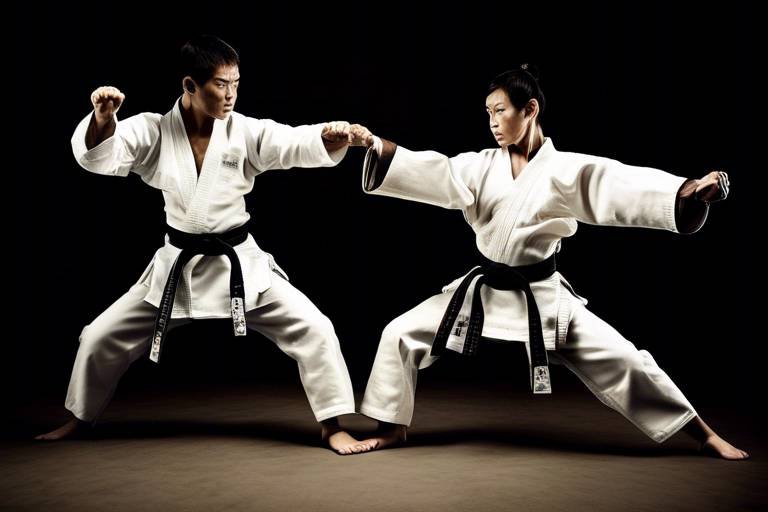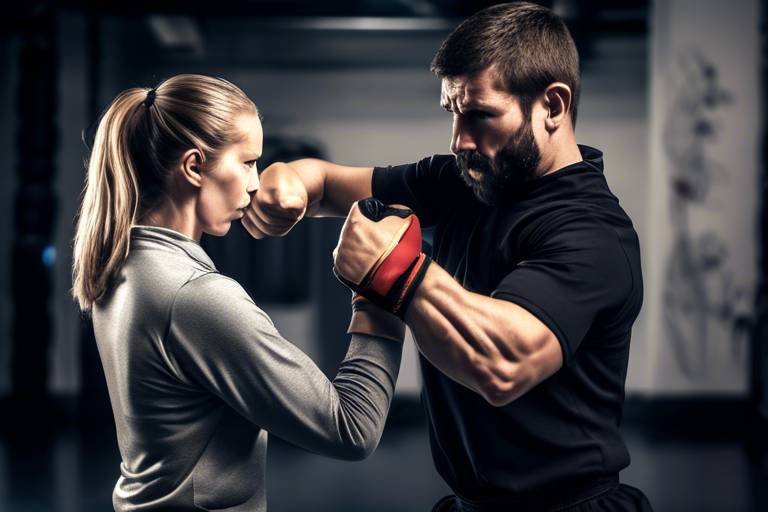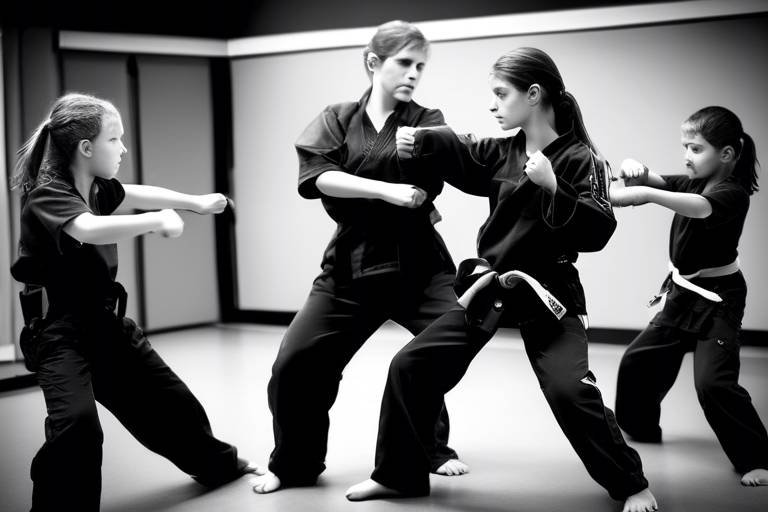Benefits of a Full Body Workout in Self-Defense Training
In today's world, being prepared for unexpected situations is more important than ever. Self-defense training plays a crucial role in equipping individuals with the skills and confidence to handle potential threats. But did you know that incorporating full body workouts into your training routine can significantly enhance your self-defense capabilities? This article dives into the myriad of benefits that full body workouts offer, from physical improvements to mental resilience, ensuring you're ready to face any challenge that comes your way.
One of the most significant advantages of full body workouts is the development of overall strength and endurance. These two attributes are essential for executing self-defense techniques effectively. Imagine trying to fend off an attacker without the muscle power to deliver a strong punch or the stamina to keep going when fatigue sets in. Full body workouts engage multiple muscle groups, allowing you to build strength in your arms, legs, and core simultaneously. This comprehensive training approach not only increases your muscle power but also enhances your stamina, enabling you to respond quickly and maintain energy during prolonged confrontations.
Flexibility and agility are crucial in self-defense scenarios. When faced with an attack, the ability to move quickly and evade strikes can be the difference between safety and harm. Full body workouts often incorporate stretching and dynamic movements, which improve your range of motion and quickness. Think of it like a dancer gracefully avoiding obstacles; that’s the kind of agility you want in a self-defense situation. By training your body to be more flexible and agile, you can not only evade attacks but also strike effectively when the opportunity arises.
A strong core is vital for maintaining balance and stability during self-defense maneuvers. Full body workouts significantly enhance core strength, contributing to better control and effectiveness in executing techniques. Picture yourself in a tense situation where you need to pivot quickly to counter an attack. If your core is weak, you might find yourself off-balance, making it difficult to execute your next move. However, with a well-conditioned core, you can maintain your footing and respond effectively, increasing your chances of success.
Training with functional movements mimics real-life situations, preparing individuals for unexpected encounters. Full body workouts focus on movements that engage multiple muscle groups, improving overall functionality in self-defense. Instead of isolating muscles, these workouts teach your body to work as a cohesive unit. For instance, consider how a squat or a lunge not only builds strength but also enhances your ability to move and react quickly in a self-defense scenario. By practicing functional movements, you’re essentially training your body to handle the unpredictable nature of real-life confrontations.
Regular full body workouts strengthen muscles and joints, significantly reducing the risk of injury during self-defense training. A well-conditioned body can better withstand the physical demands of combat situations. Imagine the frustration of being sidelined by an injury just when you need to defend yourself. By incorporating full body workouts into your routine, you’re proactively building resilience, ensuring that your body can handle the rigors of training and real-life encounters. This injury prevention aspect is crucial, especially as you push your limits in self-defense training.
Cardiovascular fitness is essential for sustained performance in self-defense. Full body workouts elevate your heart rate and improve overall cardiovascular health, enabling practitioners to fight longer without fatigue. Think about it: if you're gasping for breath in the middle of a confrontation, your ability to defend yourself diminishes significantly. By prioritizing your cardiovascular health through full body workouts, you enhance your endurance, ensuring that you can keep going when it matters most.
Engaging in full body workouts fosters mental resilience and confidence. The discipline required for consistent training translates to a stronger mindset, enhancing performance in high-pressure self-defense situations. When you push through the discomfort of a challenging workout, you build a mental fortitude that can be invaluable in real-life confrontations. This newfound confidence not only helps you face physical challenges but also empowers you to handle stressful situations with a calm and composed demeanor.
Physical activity, including full body workouts, is known to reduce stress and improve emotional health. This benefit is particularly important for self-defense practitioners who may face high-stress situations. Engaging in a rigorous workout can act as a natural stress reliever, releasing endorphins that elevate your mood. Imagine stepping off the mat after a tough session, feeling lighter and more at peace. This emotional well-being translates to a clearer mind when it comes to self-defense, allowing you to think on your feet and respond effectively.
Participating in full body workouts often involves group training, creating a supportive community. This camaraderie not only motivates individuals but also fosters a sense of belonging, enhancing the self-defense training experience. Training alongside others provides an opportunity to share experiences, learn from one another, and build lasting friendships. The collective energy of a group can push you to achieve more than you ever thought possible, making your journey in self-defense training not just about physical preparation but also about personal connections.
- Why are full body workouts important for self-defense?
Full body workouts enhance strength, endurance, flexibility, and mental toughness, all of which are crucial for effective self-defense. - How often should I incorporate full body workouts into my training?
It's recommended to include full body workouts at least 2-3 times a week to see significant benefits. - Can beginners benefit from full body workouts in self-defense?
Absolutely! Full body workouts are suitable for all fitness levels and can be adapted to meet individual needs.

Improved Strength and Endurance
When it comes to self-defense, having the right strength and endurance can make all the difference. Full body workouts are designed to target multiple muscle groups simultaneously, which not only builds muscle but also enhances overall stamina. Think of it like preparing for a marathon; you wouldn't just run a mile a day and expect to finish strong in the race. Instead, you’d incorporate various workouts that challenge your body in different ways. This is exactly what full body workouts do for self-defense practitioners.
Imagine being in a situation where you need to defend yourself. Your heart is racing, adrenaline is pumping, and you need to react quickly. If your body isn't conditioned to handle that kind of stress, you may find yourself lagging behind. Full body workouts improve your muscle power, allowing you to execute moves with precision and speed. For example, exercises like squats, push-ups, and deadlifts engage your core, legs, and upper body, ensuring that you're not just strong in one area but prepared for any physical challenge.
Moreover, these workouts enhance your endurance. Picture yourself in a self-defense scenario that lasts longer than expected. If you’ve only focused on isolated workouts, you might find yourself out of breath and unable to continue. Full body workouts, on the other hand, train your body to sustain energy over longer periods. By incorporating high-intensity interval training (HIIT) or circuit training into your routine, you can elevate your heart rate and push your limits, ultimately improving your cardiovascular endurance.
But let’s not forget about the mental aspect. The discipline required to maintain a full body workout routine fosters a strong mindset. You learn to push through fatigue and discomfort, which is crucial in self-defense situations. The more you train your body, the more confident you become in your abilities. To illustrate this, consider the following table highlighting some effective full body exercises and the muscle groups they target:
| Exercise | Targeted Muscle Groups |
|---|---|
| Squats | Legs, Glutes, Core |
| Push-ups | Chest, Shoulders, Triceps, Core |
| Deadlifts | Back, Legs, Core |
| Burpees | Full Body |
| Plank | Core, Shoulders |
In summary, full body workouts are not just about lifting weights or running; they are a comprehensive approach to building the strength and endurance necessary for effective self-defense. By engaging in these workouts, you prepare your body for the unexpected, ensuring that you can respond swiftly and effectively when it matters most. So, are you ready to take your self-defense training to the next level?
- How often should I do full body workouts for self-defense training?
It's recommended to engage in full body workouts at least 2-3 times a week to build strength and endurance effectively. - Can I do full body workouts at home?
Absolutely! Many exercises require little to no equipment, making them perfect for at-home workouts. - What if I'm a beginner?
Start with bodyweight exercises and gradually increase intensity as you become more comfortable with the movements.

Enhanced Flexibility and Agility
When it comes to self-defense, flexibility and agility are not just nice-to-have traits; they're essential. Imagine trying to dodge a punch or evade a grab without the ability to move your body fluidly. Sounds tough, right? That's where full body workouts come into play. These workouts are designed to stretch and strengthen your muscles, allowing you to move with grace and speed. By incorporating a variety of exercises that target different muscle groups, you can enhance your body's overall flexibility, making it easier to perform evasive maneuvers.
Think of flexibility as the oil in your car's engine; without it, everything grinds to a halt. Full body workouts often include dynamic movements like lunges, squats, and twists that not only improve your range of motion but also prepare your body for the unexpected. For example, a well-executed front kick requires not just leg strength but also the ability to pivot and stretch your hips. If you're not flexible, you risk injury or, worse, failing to execute the technique when it matters most.
Moreover, agility is all about your ability to change direction quickly and effectively. In a self-defense scenario, this could mean the difference between dodging an attack and being caught off guard. Full body workouts often integrate agility drills, such as ladder drills or cone sprints, which improve your footwork and coordination. The result? You become more adept at moving out of harm's way while positioning yourself to counterattack.
To illustrate the benefits of enhanced flexibility and agility through full body workouts, consider the following table:
| Aspect | Benefit | Workout Example |
|---|---|---|
| Flexibility | Improved range of motion | Dynamic stretches, yoga poses |
| Agility | Faster response times | Ladder drills, cone drills |
| Overall Performance | Enhanced technique execution | Full body circuit training |
Incorporating these elements into your training routine not only prepares you for real-life confrontations but also builds a solid foundation for long-term physical health. So, whether you're just starting your self-defense journey or looking to sharpen your existing skills, remember that flexibility and agility are your allies. The more you train your body to move freely and quickly, the better equipped you'll be when faced with unexpected challenges.
- How often should I do full body workouts for self-defense? It's recommended to engage in full body workouts at least 2-3 times a week to see significant improvements in flexibility and agility.
- Can I improve my flexibility and agility without a gym? Absolutely! Many exercises can be done at home, such as yoga, bodyweight exercises, and agility drills using minimal equipment.
- What are some good warm-up exercises for flexibility? Dynamic stretches like leg swings, arm circles, and torso twists can effectively warm up your muscles before a workout.
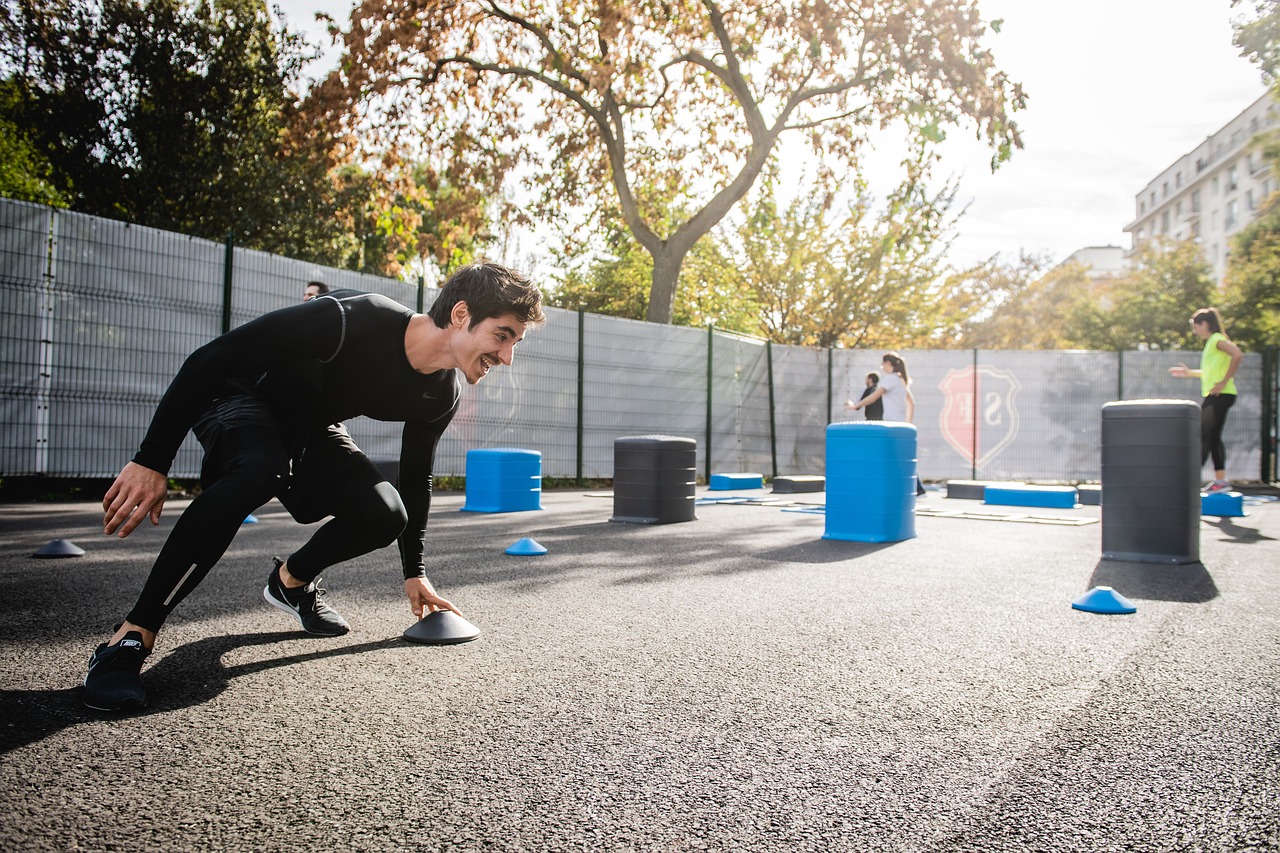
Core Stability and Balance
When it comes to self-defense, one of the most overlooked aspects is core stability and balance. These two elements are not just about looking good in a fitness class; they are fundamental to executing effective self-defense techniques. Think about it: your core is the powerhouse of your body, acting as the bridge between your upper and lower halves. A strong core allows for better control over your movements, which is crucial when you need to react quickly to an unexpected attack.
Imagine trying to throw a punch or perform a kick without a stable base. It’s like trying to shoot a cannon from a rocking boat—your aim will be off, and your power will diminish. Full body workouts specifically focus on strengthening the core through various exercises that engage multiple muscle groups. This not only improves your ability to maintain balance but also enhances your overall agility. Exercises like planks, Russian twists, and medicine ball throws are excellent for building core strength and can be seamlessly integrated into your self-defense training routine.
Moreover, having a stable core reduces the risk of injuries that can occur during self-defense practices. When your core is strong, your body can better absorb impacts and maintain proper alignment, which is vital during a confrontation. For instance, if you find yourself grappling with an opponent, a strong core helps you stay grounded and maneuver effectively, increasing your chances of escaping or countering an attack.
To illustrate the importance of core stability and balance in self-defense, consider the following table:
| Benefits of Core Stability | Impact on Self-Defense |
|---|---|
| Improved Balance | Allows for better positioning and movement during confrontations. |
| Enhanced Power | Increases the effectiveness of strikes and defensive maneuvers. |
| Reduced Injury Risk | Helps prevent common injuries related to sudden movements. |
| Greater Agility | Facilitates quick reactions and evasive actions. |
In summary, incorporating core stability and balance training into your full body workout not only enhances your self-defense capabilities but also promotes overall physical health. The synergy between a strong core and effective self-defense techniques can make a significant difference in high-pressure situations. So, the next time you're in the gym or training studio, remember: every plank, twist, and squat is not just a workout but a step towards becoming a more formidable self-defense practitioner.
- Why is core stability important for self-defense? A strong core helps maintain balance and control during defensive movements, making techniques more effective.
- How often should I train my core for self-defense? Aim for core training at least 2-3 times a week, incorporating it into your full body workout routines.
- Can I improve my core stability without gym equipment? Absolutely! Many effective core exercises, such as planks and sit-ups, can be done using just your body weight.
- What are some exercises to enhance core stability? Planks, Russian twists, mountain climbers, and medicine ball exercises are great for building core strength.

Functional Movement Patterns
When it comes to self-defense, understanding and mastering can be a game changer. These movements are not just about lifting weights or performing isolated exercises; they are designed to mimic the actions we encounter in everyday life. Think of them as the building blocks of our physical capabilities, allowing us to react swiftly and efficiently in unexpected situations. For instance, consider how a simple squat can translate into a powerful defensive maneuver, or how a lunge can help you evade an incoming attack. By training with a focus on these functional movements, you are essentially preparing your body for the unpredictable nature of real-life confrontations.
Full body workouts that emphasize functional movement patterns engage multiple muscle groups simultaneously. This is crucial because self-defense isn't about brute strength alone; it's about coordination, balance, and fluidity of motion. For example, a combination of pushing, pulling, and twisting movements can enhance your ability to grapple or escape from a hold. By integrating exercises like kettlebell swings, medicine ball throws, and rotational movements, you develop a body that moves as one cohesive unit, rather than a collection of isolated parts.
Moreover, these workouts help improve your proprioception, which is your body's awareness of its position in space. This heightened awareness is vital in self-defense situations where you need to react quickly. Imagine being able to duck, weave, or pivot away from an attacker without even thinking about it. That’s the power of functional training!
To illustrate the benefits of functional movement patterns, consider the following table that highlights some common exercises and their applications in self-defense:
| Exercise | Self-Defense Application |
|---|---|
| Squats | Building leg strength for quick movements and stability. |
| Lunges | Improving balance and the ability to evade attacks. |
| Push-Ups | Enhancing upper body strength for effective strikes. |
| Medicine Ball Throws | Developing explosive power for quick, decisive actions. |
| Rotational Twists | Increasing core strength and agility for grappling and escaping holds. |
In summary, incorporating functional movement patterns into your full body workouts not only prepares you for self-defense situations but also enhances your overall physical fitness. By training in a way that reflects real-life demands, you equip yourself with the tools necessary to handle any scenario that may arise, making you more confident and capable in your self-defense journey.
- What are functional movement patterns? Functional movement patterns are exercises that mimic everyday activities, helping to improve strength, balance, and coordination necessary for real-life situations.
- How do full body workouts benefit self-defense training? Full body workouts enhance overall strength, endurance, flexibility, and agility, all of which are crucial for effective self-defense.
- Can I perform functional movements at home? Absolutely! Many functional exercises require little to no equipment and can be done in the comfort of your own home.
- Is it necessary to have prior fitness experience to start functional training? No, functional training is suitable for all fitness levels. You can start with modified exercises and gradually progress as you build strength and confidence.

Injury Prevention
When it comes to self-defense training, one of the most overlooked aspects is . Imagine you're in a high-stakes situation, and your body isn't prepared to handle the physical demands of defending yourself. That's where full body workouts come into play. By engaging in a comprehensive training regimen that targets all muscle groups, you significantly reduce the likelihood of injuries that can occur during self-defense scenarios.
Full body workouts are designed to strengthen not just specific muscles, but also the muscles and joints that are crucial for stability and movement. For instance, exercises like squats, lunges, and push-ups are not just about building bulk; they enhance the functional strength necessary for executing self-defense techniques effectively. When your body is conditioned, it can better absorb impacts and withstand the physical challenges of a confrontation.
Consider this: if you were to suddenly engage in a physical altercation without proper conditioning, the chances of strains, sprains, or even fractures increase dramatically. On the other hand, a well-rounded workout routine improves your body’s resilience. Here are a few key benefits of injury prevention through full body workouts:
- Strengthened Muscles: Regular training fortifies the muscles, making them less prone to injury.
- Improved Joint Stability: Full body exercises enhance the stability of your joints, which is critical during quick movements.
- Enhanced Flexibility: Incorporating stretching and mobility work into your routine can prevent tightness and improve your range of motion.
Moreover, the repetitive nature of full body workouts allows your body to adapt to the stresses of training. This adaptation is key in preventing injuries. For example, when you perform a movement repeatedly, your body learns to execute it more efficiently, reducing wear and tear on your joints and muscles. This principle is often referred to as progressive overload, where you gradually increase the intensity of your workouts to build strength without risking injury.
Additionally, it's important to listen to your body. If you feel pain or discomfort during a workout, it's essential to stop and assess the situation. Ignoring these signals can lead to serious injuries that could sideline you from both training and self-defense practice. Always remember, it's better to take a step back and allow your body to recover than to push through and potentially cause long-term damage.
In conclusion, incorporating full body workouts into your self-defense training not only enhances your strength and endurance but also plays a crucial role in . By building a well-conditioned body, you prepare yourself not just for the physical aspects of self-defense, but also for the unpredictable nature of real-life confrontations.
Q1: How often should I do full body workouts for injury prevention?
A1: Ideally, you should aim for at least 2-3 full body workouts per week, allowing for rest and recovery between sessions.
Q2: Can I still do self-defense training if I have a previous injury?
A2: Yes, but it’s crucial to consult with a healthcare professional or a certified trainer to tailor your workouts and avoid aggravating your injury.
Q3: What types of exercises should I include in my full body workout?
A3: Focus on compound movements such as squats, deadlifts, push-ups, and pull-ups, as they engage multiple muscle groups and enhance functional strength.
Q4: How can I improve my flexibility to prevent injuries?
A4: Incorporate dynamic stretching before workouts and static stretching afterward, focusing on major muscle groups involved in self-defense movements.

Cardiovascular Health
When it comes to self-defense training, having a strong cardiovascular system is not just a bonus; it's a necessity. Imagine being in a high-pressure situation where your heart is racing, and your body is screaming for oxygen. This is where the magic of full body workouts comes into play. These workouts elevate your heart rate significantly, enhancing your cardiovascular endurance and allowing you to perform at your best when it matters most.
Engaging in full body workouts can lead to substantial improvements in your cardiovascular health. Not only do these workouts get your heart pumping, but they also promote better circulation and oxygen delivery throughout your body. This means more energy and improved recovery times, which are crucial during long training sessions or real-life confrontations. The more you train your heart, the more efficient it becomes, and the less fatigue you'll experience during intense physical activity.
But what does this really mean for your self-defense training? Well, let’s break it down. Here are a few key benefits:
- Increased Stamina: Full body workouts condition your body to endure longer periods of exertion, ensuring that you can keep fighting or evading attacks without running out of steam.
- Enhanced Recovery: A well-conditioned heart allows for quicker recovery between bouts of activity, meaning you can bounce back faster after exerting yourself.
- Improved Overall Health: Regular cardiovascular exercise lowers the risk of heart disease, high blood pressure, and other health issues that could hinder your training.
Moreover, incorporating cardiovascular elements into your workouts, such as high-intensity interval training (HIIT), can mimic the unpredictable nature of a self-defense scenario. This not only prepares your body physically but also mentally, as you learn to manage your energy and remain composed under pressure. Think of it as training your body to operate like a finely tuned engine—efficient, powerful, and ready to respond at a moment's notice.
In conclusion, prioritizing cardiovascular health through full body workouts is a game changer for anyone serious about self-defense training. It equips you with the endurance and resilience needed to face real-life challenges head-on. So, lace up those sneakers, hit the gym, and get that heart pumping!
- How often should I do full body workouts for self-defense training? Aim for at least three times a week to see significant improvements in your strength, endurance, and overall fitness.
- Can I do full body workouts at home? Absolutely! Many exercises can be done with minimal equipment, making it easy to train wherever you are.
- What are some good full body exercises? Some effective exercises include squats, push-ups, burpees, and kettlebell swings, which engage multiple muscle groups.

Mental Toughness and Confidence
Engaging in full body workouts not only transforms your physique but also plays a pivotal role in developing mental toughness and confidence. Imagine stepping into a self-defense scenario where your heart is racing, and adrenaline is pumping. Now, picture having the mental fortitude to stay calm and focused. That's the power of consistent training!
When you commit to a rigorous workout routine, you are essentially training your mind as much as your body. Each session pushes you to overcome physical barriers, which in turn builds resilience. This resilience translates into mental strength, allowing you to tackle challenges head-on, both in the gym and in real-life situations. Think of it like a muscle; the more you work on it, the stronger it gets.
Moreover, the discipline required for full body workouts fosters a sense of achievement. Every time you complete a challenging routine or reach a new personal best, you reinforce your belief in your abilities. This newfound confidence is crucial in self-defense scenarios where hesitation can be detrimental. It’s like having a superpower; you know you can handle whatever comes your way!
Additionally, the social aspect of group workouts can amplify this effect. Training alongside others creates a supportive environment where you can share experiences and motivate each other. This camaraderie can significantly enhance your self-esteem, as you realize you are part of a community striving for the same goals. The encouragement from peers acts like a booster shot for your confidence, making you feel more equipped to handle confrontational situations.
So, how can you cultivate this mental toughness through full body workouts? Here are a few strategies:
- Set clear goals: Establishing achievable fitness goals can provide a roadmap for your training, allowing you to track progress and celebrate milestones.
- Embrace challenges: Don’t shy away from difficult workouts. Tackling tough routines head-on will prepare you for unexpected situations.
- Practice mindfulness: Incorporating meditation or breathing exercises into your routine can help you maintain focus and composure during both workouts and real-life confrontations.
In summary, the impact of full body workouts on mental toughness and confidence is profound. By pushing your physical limits, you are simultaneously fortifying your mental state, preparing you not just for self-defense, but for life's myriad challenges. After all, when you train your body to be strong, you also train your mind to be unyielding!
- How often should I engage in full body workouts to build mental toughness?
It’s recommended to aim for at least 3-4 sessions per week, allowing your body and mind to adapt and grow stronger. - Can I achieve mental toughness without intense workouts?
While full body workouts are effective, mental toughness can also be developed through other activities like yoga, martial arts, or even challenging hobbies. - What are some signs that my mental toughness is improving?
Increased resilience in stressful situations, greater self-confidence, and a more positive mindset are all indicators of improved mental toughness.

Stress Relief and Emotional Well-being
Engaging in full body workouts is more than just a means to improve physical fitness; it serves as a powerful antidote to the stressors of daily life. Think about it: when you’re caught up in the hustle and bustle of work, family responsibilities, and personal obligations, where can you find a refuge? Full body workouts provide that escape, allowing you to channel your energy into something constructive. The act of moving your body, breaking a sweat, and pushing your limits can be incredibly liberating.
During these workouts, your body releases endorphins, often referred to as the “feel-good” hormones. These natural chemicals interact with the receptors in your brain, leading to a positive feeling in the body. So, not only are you building strength and endurance, but you’re also giving your mood a significant boost. It’s like a natural high that helps you combat anxiety and depression. In fact, studies have shown that regular physical activity can reduce feelings of stress and enhance overall emotional well-being.
Moreover, the structure and routine of full body workouts can provide a sense of stability in an otherwise chaotic world. When you commit to a training schedule, you’re not just investing in your physical health; you’re also cultivating a disciplined mindset. This discipline can spill over into other areas of your life, making you more resilient when faced with challenges. Imagine how much easier it is to tackle a stressful work project when you’ve just crushed a workout session!
Additionally, full body workouts often foster a sense of community. Whether you’re hitting the gym with friends or participating in group classes, the camaraderie built during these sessions can be invaluable. Sharing the experience of sweating it out together creates bonds that can help alleviate feelings of isolation. You’re not just training your body; you’re also building connections that provide emotional support. This social aspect of training can be a game-changer, as it encourages accountability and motivation.
In summary, full body workouts offer a multifaceted approach to stress relief and emotional well-being. They not only enhance your physical capabilities but also equip you with mental resilience and a supportive community. So, the next time you’re feeling overwhelmed, consider hitting the gym or joining a class. Your body and mind will thank you!
- How often should I engage in full body workouts for stress relief? It’s recommended to aim for at least 3-4 sessions per week to experience significant benefits.
- Can full body workouts replace traditional therapy for stress management? While they can be a great supplement, they should not replace professional therapy if needed.
- What types of exercises are included in a full body workout? Full body workouts typically include exercises like squats, push-ups, lunges, and core exercises that engage multiple muscle groups.
- Is it necessary to join a gym for full body workouts? No, you can perform full body workouts at home using bodyweight exercises or minimal equipment.

Community and Support
Engaging in full body workouts isn't just about building muscle or improving your stamina; it's also about fostering a sense of community and support. When you train with others, you create bonds that go beyond the gym walls. Imagine stepping into a room filled with individuals who share your goals, fears, and aspirations. This shared experience can be incredibly motivating and uplifting. It transforms solitary workouts into a collective journey towards self-improvement.
In a self-defense training context, this community aspect becomes even more vital. Practicing alongside others allows you to learn from one another, share tips, and even spar in a safe environment. The camaraderie built during these sessions can help reduce the intimidation factor that often accompanies self-defense training. Instead of feeling like you're navigating a daunting path alone, you have a group of like-minded individuals cheering you on, celebrating your progress, and helping you through your challenges.
Moreover, participating in group workouts often leads to the formation of friendships that extend beyond training sessions. These relationships can provide additional support in your self-defense journey, whether it's through accountability partners, training buddies, or simply having someone to share your victories with. The emotional support from your community can enhance your overall experience and encourage you to push through tough days when motivation wanes.
Consider this: when you're part of a supportive community, you're more likely to show up consistently. You're less likely to skip a workout when you know your friends are counting on you. This accountability can be a game-changer, especially when the going gets tough. Plus, the environment of mutual encouragement fosters a positive atmosphere where everyone feels valued and empowered to grow.
In summary, the found in full body workouts can significantly enhance your self-defense training experience. Not only do you get to improve your physical abilities, but you also cultivate lasting relationships and emotional resilience that can carry you through both training and real-life challenges.
- What are the benefits of joining a self-defense community? Joining a self-defense community provides support, motivation, and opportunities for learning from others' experiences.
- How can I find a local group for full body workouts? Look for local gyms, community centers, or online platforms that offer group classes or workshops in your area.
- Can I train for self-defense on my own? While solo training is beneficial, practicing with a group enhances learning and provides crucial feedback.
- What should I look for in a self-defense training group? Look for a group that emphasizes safety, inclusivity, and offers experienced instructors who can guide you effectively.
Frequently Asked Questions
- What are the main benefits of full body workouts for self-defense training?
Full body workouts enhance strength, endurance, flexibility, and agility, all of which are crucial for effective self-defense. They also improve core stability and balance, helping practitioners execute techniques more efficiently. Additionally, these workouts reduce the risk of injury and boost cardiovascular health, allowing individuals to perform under pressure.
- How do full body workouts improve mental toughness?
Engaging in consistent full body workouts fosters discipline and resilience. This mental training helps individuals build confidence and prepares them to handle high-pressure self-defense situations. Over time, the physical challenges faced during workouts translate into a stronger mindset in real-life encounters.
- Can full body workouts help with stress relief?
Absolutely! Physical activity, including full body workouts, is a proven method for reducing stress and enhancing emotional well-being. Regular exercise releases endorphins, which can improve mood and help self-defense practitioners manage anxiety when facing potential confrontations.
- What role does community play in full body workout sessions?
Participating in group workouts fosters a sense of community and support. This camaraderie motivates individuals to push themselves further and creates a welcoming environment for learning self-defense techniques. Being part of a group can enhance the overall training experience and build lasting friendships.
- How often should I engage in full body workouts for optimal self-defense training?
For optimal results, it's recommended to engage in full body workouts at least 2-3 times a week. This frequency allows your body to build strength, endurance, and flexibility while also giving you enough time to recover. Consistency is key to seeing improvements in your self-defense skills.
- Are there specific exercises that are particularly beneficial for self-defense?
Yes! Exercises that focus on functional movements, such as squats, lunges, push-ups, and core exercises, are particularly beneficial. These movements mimic the physical demands of self-defense situations, helping to prepare your body for unexpected encounters while improving overall functionality.
- Can beginners benefit from full body workouts in self-defense training?
Definitely! Full body workouts are suitable for individuals of all fitness levels, including beginners. Starting with basic movements can help build a solid foundation of strength and endurance, making it easier to progress to more advanced self-defense techniques as confidence and skill levels increase.










